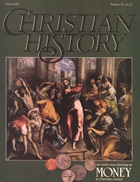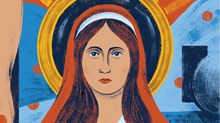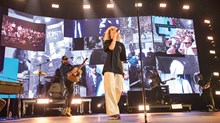An armor-clad knight with a lance, oil-tempered sword and plumed helmet rode his war charger out of Assisi to battle against his neighboring Italian town of Perugia. When this brave youth, Francesco Bernardone, saw the wretched specter of a leper in the road, he spurred his horse to flee. But as he galloped by, Francis thought he recognized Christ in the contorted face of the outcast. Abruptly he stopped, dismounted, kissed the leper, gave alms, seated the man on the charger and led the way to the leper’s destination.
Before this experience, Francis so loathed the sight of lepers that he would look at their houses only from a distance of two miles while holding his nose. But Francis later said of this experience, “…What had previously nauseated me became a source of spiritual and physical consolation…. After that I did not wait long before leaving the world.”
For Francis, leaving the world meant caring for lepers and praying in deserted chapels. Pietro Bernardone, the wealthy father of Francis, was exasperated by this religious fanaticism and eventually disowned his son. In turn, Francis renounced all right to his inheritance.
Upon abandoning his own wealth, Francis determined that there must be no man anywhere poorer than he. No matter what rags Francis might be wearing, should he meet upon a beggar dressed even worse, Francis would immediately remove his own clothing and give it to the beggar. “I think the great Almsgiver would account it a theft in me,” he said, “did I not give that I wear unto one needing it more.”
Alms for the Poor
One day, contrary to his custom, Francis severely rebuked a poor man who had asked for alms. Immediately sorry, he began to upbraid himself that it was a shame to hold back from one in great need. Francis resolved in his heart never in the future to refuse the requests of anyone, if at all possible. He thus began to practice— before he began to teach—the biblical counsel: “To him who asks of thee, give; and from him who would borrow of thee, do not turn away” (Matt. 5:42).
Learning to live among the destitute was no easy transition for the once wealthy Francis. It was humiliating when first he took a beggar’s sack, went with it into town, and begged for alms from door to door. He put all the collected food in a bowl, sat down to eat it, but found this hodge-podge utterly sickening. What was this food? Probably a fish head, maybe a bacon rind, no doubt bean soup and turnips or millet gruel, and perhaps a handful of olives or some dried fruit. For dessert he may have had some bits of barley, or a cheese rind.
It was hard for the young radical to look at such stuff, much less eat it. Finally he overcame himself and consumed the mixture of garbage, and it seemed to him as if he had never tasted such delicious food. He thanked God who had transformed the bitterness to sweetness for him, and had increased his strength with the nourishment.
From this time forward Francis praised the seeking of alms and said that shame in begging is the enemy of salvation. He did nothing to keep this opinion to himself. When Pope Gregory was still a bishop, Francis and others were invited to dinner. Francis went out to beg for alms, returned, and amiably distributed scraps of black bread to the knights and chaplains gathered around the table. At the conclusion of dinner Gregory took Francis aside and asked why he brought shame on the embarrassed bishop by this bold act. Francis countered that in fact he had shown honor to Gregory, for the Lord is pleased with poverty, said Francis, particularly voluntary poverty.
Francis went about telling people of Christ in the Italian language, not in ecclesiastical Latin. His motivation was to live as Jesus had lived and to preach as Jesus preached. As disciples gathered, Francis first required them to say goodbye to the world, give all outward possessions to God, and then offer themselves inwardly to God. The lifestyle of these brothers was characterized by working in the world to help others, preaching the gospel and caring for the sick and suffering, and obeying the gospel literally— giving up everything for Christ. The brothers were not allowed to handle money. Rather, they expected to be paid for their work in food and clothing, but if not, they must beg for necessities.
Francis taught that a true Friar Minor should not go long without going out to beg alms, for in begging would “merits be heaped up for him.” Once when a certain brother returned from Assisi with an alms, Francis proclaimed, “Blessed be my brother who goes out readily, begs humbly, and returns rejoicing.”
Francis felt that a brother should have no more than two tunics, these to be made of rough material. He permitted those who were sick to have a soft tunic against the skin on the condition that the outward roughness of the habit be preserved.
The Value of Dung
The chronicle of Francis’s life leads one to suspect that after mastering his aversion to lepers, he transferred that aversion to money. Francis would not use money, touch it, or in any way allow his Friars Minor to be defiled by it. He did not permit them to store up money or provisions for a rainy day. And he attacked the subtle temptation of pious Christians to pile up wealth under the pretext of using it to beautify churches or serve God.
Francis repeatedly referred to money as “dung,” and held that money should be shunned as the devil himself. Once when a secular person entered the church of St. Mary of the Portiuncula to pray, he left a sack of money near the cross as an offering. A brother touched the money with his hand while throwing it on the window sill. For this Francis severely rebuked the brother, commanding him to take the money from the window sill with his mouth and put it with the pile of animal excrement outside.
On another occasion two brothers on the way to a leper hospital saw a coin on the road. Instead of tramping on it as though it were dust, they stopped to discuss what was to be done with the “dung.” One of the brothers began to pick up the coin to offer it to the lepers, but his companion forbade him, lest he be deceived by false piety.
Today we use the words “money” and “property” interchangeably, but to Francis they were not the same. Money was dung; property was less strongly condemned. It was during the century in which Francis lived that the church and all of society underwent a change from a barter economy to a money economy. Had the coin on the road been a scrap of bread, no doubt the disciples of Francis would have seen no moral dilemma with picking it up and either eating it or giving it to another.
Yet Francis longed for poverty, considering it especially dear to the Son of God. It is doubtful that anyone desired riches as greatly as Francis desired poverty. When he saw someone poorer than himself, he was immediately envious. He chose poverty as his spouse, as his wealth, and sought to be the poorest of men for Christ’s sake. From the very beginning of his religious life until his death he had trousers, a tunic, a cord to tie it around himself, and nothing else. When a poor man asked an alms of him, he was known to unsew the border of his tunic, or give away his trousers, when that was all he had to give.
Once the mother of two brothers came asking for alms, but there was nothing left in the house to give except a New Testament. Francis said to give the woman the New Testament so she could sell it and thereby take care of her needs. Since we are admonished by the Bible to help the poor, Francis believed that the gift of the Testament would be more pleasing to God than his reading from it.
Although Francis did not view property as dung, he strongly opposed any hint of materialism. When friars wanted books and Bibles so they could study and teach Scripture, Francis objected. He reasoned that if you own a book, you need a waterproof cover to keep it in, a candle to read it by, a pen for making notes, a desk to write on, a chair for the desk, a house for the furniture, a servant to clean house….
Consistent with his abhorrence of all things material, Francis taught the brothers to build cheap little houses of wood, not of stone. Once, upon his return to St. Mary of the Portiuncula, he discovered a newly built, comfortable home. Thinking that living in such a dwelling would lead to pride, Francis began to dismantle it by tearing slates and tiles from the roof. He was persuaded to stop only when someone explained that the house didn’t belong to his order.
Simple Faith
More than 3,000 disciples of Francis gathered for a general meeting in 1218. A visiting cleric saw that Francis had made no provision for the gathering and asked, “Could faith be so naively simple?” Francis answered, “Faith that is not simple can never move a feather, let alone a mountain…. ‘Be not anxious for your life, what you shall eat or what you shall drink’ … The Heavenly Father can be trusted to the limit…, and beyond.” As he spoke, unasked-for horse carts began to appear from every direction, loaded with food contributed from various cities.
When Francis was sick and near death, the people of Assisi sent knights to bring him back home. Hunger and fatigue halted the party as they came through the poor village of Satriano, but the knights could find no food for sale. They came back to Francis and requested a morsel from his alms sack, but the old saint rebuked them for trusting more in their “flies” (another of his terms for money) than in God. They were sent again, this time instructed to offer God’s love in place of money while begging humbly for an alms. The knights swallowed their shame, did as Francis instructed, and discovered they could buy more with the love of God than they could with money, for all gave gladly.
Shortly thereafter Francis died. The last words of this poor man who had nothing and gave everything were, “I have done my duty; may Christ now teach you yours.”
V. Runyon is a writer and free-lance editor with an M.A. in communication from Wheaton College in Illinois. He is co-author of The Divided Flame and of Foresight.
Copyright © 1987 by the author or Christianity Today/Christian History magazine.
Click here for reprint information on Christian History.

Support Our Work
Subscribe to CT for less than $4.25/month




























